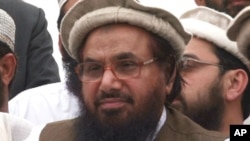Police in Pakistan have arrested an Islamist cleric whom the United States has designated as a global terrorist for his alleged role in the deadly 2008 attacks on the Indian city of Mumbai.
Hafiz Saeed, the founder of the outlawed Lashkar-e-Taiba (LeT) militant group and head of its banned charity wing, Jamaat-ud-Dawa (JuD), was traveling to the city of Gujranwala in Punjab province when he was taken into custody.
A spokesman for the provincial counterterrorism department said Saeed was taken to the city’s anti-terrorism court where the judge ordered the cleric held in jail for a week.
The court also directed authorities to complete investigations into money laundering and terrorism financing charges against the radical cleric so he could be put on trial.
Pakistani authorities have recently initiated more than 20 cases against Saeed and several of his aides pertaining to the JuD’s alleged involvement in money laundering and terrorism financing.
The arrest comes ahead of next week’s visit to Washington by Prime Minister Imran Khan, where he is scheduled to hold his first meeting with U.S. President Donald Trump on July 22 to discuss, among other things, Pakistani counterterrorism efforts.
A spokesman for Saeed’s JuD charity dismissed the allegations and vowed his group will challenge the arrest as well as what he called baseless terrorism-related charges in a higher court.
Saeed has consistently denied his involvement in the Mumbai attacks, which killed more than 160 people. Indian authorities accuse LeT of planning and executing the carnage. The cleric, however, insists he ended his association with LeT in 2001.
Washington has placed both LeT and JuD on its list of global terrorist groups. U.S. authorities offered $10 million for information that would help bring Saeed to justice.
Saeed had previously been arrested along with his senior aides but succeeded in convincing Pakistani courts to release them for a lack of evidence linking them to terrorism charges.
International pressure and rising tensions with India have recently prompted Pakistan to ban Saeed’s charities. The government has also taken control of JuD-run welfare hospitals and religious seminaries.
In 2017, Pakistan was placed on a watch list by the Paris-based Financial Action Task Force (FATF) for not cracking down on militant groups, including LeT and JuD, operating on its soil.
The global group, which monitors curbs on money laundering and terrorism financing, will hold a crucial meeting in October to decide whether or not to blacklist Pakistan.
If blacklisted, the move could add to Pakistan's economic woes because it would make it extremely difficult for the country to deal with global financial institutions and bring home much-needed foreign investment.




